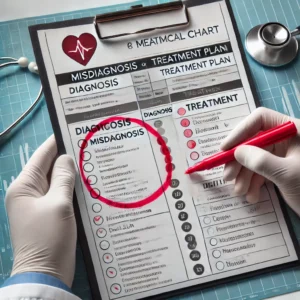Inaccurate medical records can profoundly affect a patient’s health, well-being, and legal standing. These records are critical in ensuring that healthcare providers offer the correct diagnosis, treatment, and ongoing care.
However, inaccuracies can lead to devastating outcomes, such as wrongful denial of insurance claims and incorrect medical treatments.
This article explores when such inaccuracies become a legal issue, the types of lawsuits that can arise, and how personal injury and mass tort attorneys can assist clients affected by inaccurate medical records.
When Does an Inaccuracy Become a Legal Issue?
Differentiating Between Minor Errors and Substantial Inaccuracies
Not all errors in medical records are created equal. Some might be as trivial as a typo or a slight miscommunication that has no real impact on the patient’s care. These minor errors, while annoying, typically do not lead to legal action because they do not harm the patient or significantly affect their treatment.
Conversely, substantial inaccuracies can have severe implications. These might include misrepresentations or omissions that directly impact a patient’s health.
For example, if a medical record incorrectly notes a patient’s allergy status or fails to document a critical health condition, the resulting treatment could cause significant harm. When such errors lead to injury, the potential for legal action increases.
Impact of Inaccuracy and Severity on Lawsuits
The likelihood of a lawsuit depends heavily on the severity of the inaccuracy. Minor inaccuracies are generally less likely to result in legal action since they usually do not harm. However, substantial inaccuracies that lead to incorrect diagnoses, improper treatment, or other forms of harm can be grounds for a lawsuit. The critical consideration is whether the error in the medical record directly caused harm or worsened the patient’s condition.
Duty of Care and Legal Action
Healthcare providers have a duty of care to their patients, which means they are legally obligated to provide competent and reasonable care.
Patients may have grounds to sue for negligence or malpractice when this duty is breached, such as when they rely on inaccurate medical records to make treatment decisions.
Inaccurate record-keeping can lead to a breach of duty, which can cause significant harm. The patient may be entitled to compensation if this harm can be proven in court.
Concept of Causation
Causation is a critical element in any lawsuit related to inaccurate medical records. For a lawsuit to be successful, it must be proven that the inaccuracy in the record directly led to the patient’s harm. This can be challenging, as the link between the error and the injury must be clear.
For instance, causation can be established if a patient receives improper medication due to a misrecorded allergy and suffers adverse effects. However, the case may only succeed if the harm is directly tied to the accurate record.
Examples of Harm from Inaccurate Records
Wrongful denial of insurance coverage
For instance, if a medical record inaccurately indicates a pre-existing condition the patient does not have, the patient might be wrongfully denied insurance coverage for a related treatment.
Delayed or incorrect diagnosis
Errors in recording symptoms can lead to delays in diagnosis or incorrect diagnoses, adversely affecting treatment outcomes.
Improper treatment due to misinformation
If critical information such as allergies or medication history is recorded incorrectly, the patient might receive inappropriate treatment.
Difficulty obtaining future medical care
A patient’s inaccurate medical history can make obtaining future medical care difficult. Erroneous information can affect any future diagnosis or course of treatment, potentially leading to delays or incorrect treatments.
Types of Lawsuits Related to Inaccurate Medical Records
Medical Malpractice
Medical malpractice occurs when a healthcare provider’s negligence leads to patient harm. Inaccurate medical records can be a significant factor in malpractice claims, mainly if they contribute to incorrect treatment decisions.
For example, if a misdiagnosis or wrong treatment plan is based on faulty records, the patient may suffer harm, establishing grounds for a malpractice lawsuit.
The essential elements of a medical malpractice claim include the following:
- Proving that the healthcare provider had a duty of care;
- This duty was breached through inaccuracies in the medical records;
- The breach caused the patient harm and resulted in damages.
When inaccurate records lead to these outcomes, they fulfill the criteria for a medical malpractice claim.
Negligent Infliction of Emotional Distress
Inaccurate medical records can also cause significant emotional distress. Patients might experience fear, anxiety, or reputational harm due to errors in their medical records.
For instance, a patient misdiagnosed with a severe illness based on inaccurate records could suffer severe emotional trauma, forming the basis for a negligent infliction of emotional distress lawsuit.
Similarly, the reputational damage could lead to a lawsuit if a patient’s private medical information is incorrectly recorded and shared.
HIPAA Violations
The Health Insurance Portability and Accountability Act (HIPAA) mandates that healthcare providers maintain accurate and secure medical records. Inaccuracies in medical records can violate HIPAA if they compromise patient privacy or the accuracy of medical information.
For example, if incorrect medical information is recorded and shared without proper safeguards, it could breach HIPAA, potentially leading to legal action against the responsible healthcare provider.
Considerations for Personal Injury and Mass Tort Attorneys
Potential for Medical Record Inaccuracies

These inaccuracies might result from misdiagnoses, failure to accurately document a patient’s medical history, or omissions regarding adverse medication reactions.
Attorneys handling these cases must be vigilant in identifying and addressing such inaccuracies, as they can significantly impact the outcome.
Importance of Reviewing Medical Records
A thorough review of medical records is essential in any personal injury or mass tort case. Inaccurate or incomplete records can weaken a plaintiff’s case while identifying and correcting these inaccuracies can strengthen it.
For example, a missing entry regarding a patient’s adverse drug reaction could indicate negligence and bolster the plaintiff’s claim.
Attorneys must meticulously examine medical records to uncover any discrepancies that could support their client’s case.
Challenges Associated with Proving Causation
Proving causation in cases involving inaccurate medical records can be complex. The attorney must demonstrate that the inaccuracies directly resulted in the patient’s harm, which can be difficult, notably if multiple factors contributed to the injury.
For instance, if a patient has underlying medical conditions that could also explain their symptoms, it may be challenging to prove that the inaccuracies in their records were the sole cause of harm.
Legal Consequences of Inaccurate Medical Records

Importance of Legal Expertise in Handling These Cases
Given the complexities involved in cases related to inaccurate medical records, having legal representation with expertise in this area is crucial. Experienced personal injury and mass tort attorneys are best equipped to navigate legal challenges and advocate effectively for their clients. They can identify potential inaccuracies, establish causation, and build a solid case to secure the best possible outcome for their clients.
FAQs
Can I sue for a minor error in my medical records?
Typos or slight miscommunications that do not harm the patient are minor medical records errors. They are generally not grounds for a lawsuit. Legal action typically requires substantial inaccuracies that directly lead to harm.
How do I get inaccurate information removed from my medical records?
Patients can request corrections to their medical records by contacting their healthcare provider and providing evidence of the inaccuracy. The provider must correct or add a note explaining why the change was not made.
What happens if inaccurate medical records cause me harm?
If inaccurate medical records cause harm, such as through incorrect treatment or delayed diagnosis, the patient may have grounds to sue for medical malpractice. It is advisable to consult with an attorney to assess the specific circumstances.
What kind of lawyer do I need for a medical record error lawsuit?
A medical malpractice attorney is typically the best choice for handling lawsuits related to inaccurate medical records. They have the expertise to navigate the complex legal issues involved in these cases.
Are there other ways to fix inaccurate medical records besides suing?
Yes, patients can request corrections directly from their healthcare provider. If the provider refuses, patients can file a complaint with the Office for Civil Rights (OCR) under HIPAA. Suing is generally considered a last resort when harm has already occurred.









